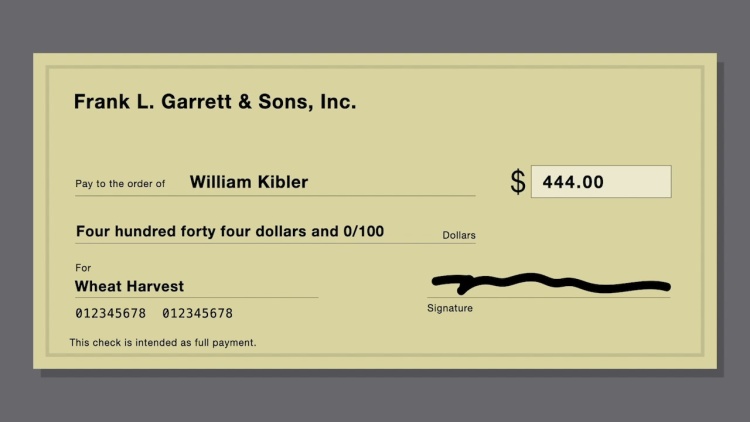Kibler v. Frank L. Garrett & Sons, Inc.
Washington Supreme Court
439 P.2d 416 (1968)

- Written by Denise McGimsey, JD
Facts
Frank L. Garrett & Sons, Inc. (Garrett) (defendant) hired Kibler (plaintiff) to harvest its wheat crop. The parties did not agree on the price to be paid, and Kibler told Garrett that the price charged could be affected by circumstances occurring during the harvest. When the work was complete, Kibler submitted an invoice based on 25 cents per bushel. He then sent a substitute invoice based on 20 cents per bushel, amounting to a total charge of $876.20. Garrett responded with a check for $444 and a letter stating, in relevant part, that the $444 was 50 percent more than what Garrett paid the previous year for the same work and 20 percent more than what Kibler agreed to. The letter further stated that the amount invoiced by Kibler was “ridiculous.” Kibler called his attorney and asked whether he could deposit the check. The attorney told him to read off any notations on the check. Kibler read off “Harvesting Wheat Washington Ranch,” which had been typed, and “Frank L. Garrett & Sons, Inc.,” which had been printed. He failed to see, or read to his attorney, a line of small type on the form check that read, “By endorsement this check when paid is accepted in full payment of the following account.” With his attorney’s approval, Kibler deposited the check and brought suit against Garrett. After Kibler’s evidence was presented, the judge dismissed his claim on the grounds of accord and satisfaction even though Garrett had not raised accord and satisfaction as a defense to the claim. Kibler appealed.
Rule of Law
Issue
Holding and Reasoning (Rosellini, J.)
Dissent (Hale, J.)
What to do next…
Here's why 905,000 law students have relied on our case briefs:
- Written by law professors and practitioners, not other law students. 47,100 briefs, keyed to 995 casebooks. Top-notch customer support.
- The right amount of information, includes the facts, issues, rule of law, holding and reasoning, and any concurrences and dissents.
- Access in your classes, works on your mobile and tablet. Massive library of related video lessons and high quality multiple-choice questions.
- Easy to use, uniform format for every case brief. Written in plain English, not in legalese. Our briefs summarize and simplify; they don’t just repeat the court’s language.





